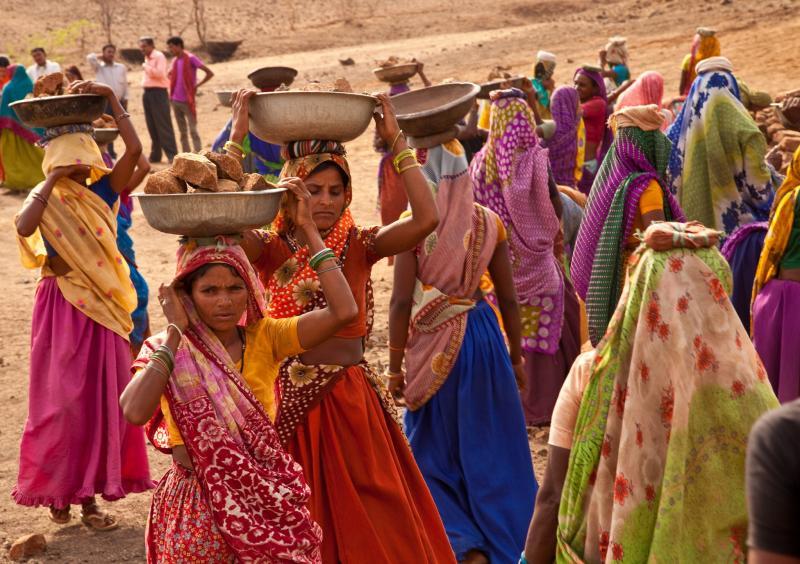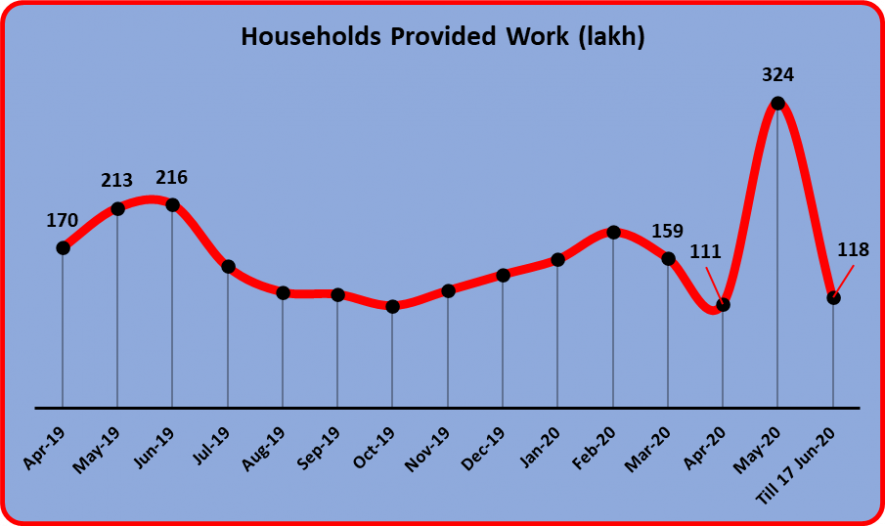Over 2 Crore MGNREGA Job Seekers Turned Back Since April

Representational image. | Image Courtesy: The Wire
In the two and a half months since this financial year began on April 1, the vital rural jobs guarantee scheme has seen over 7.3 crore persons apply for jobs. Despite a promise of injecting additional Rs.40,000 crore for boosting the scheme, this surge in demand is not being met. Official data shows that over 2 crore persons were refused work. That’s about 28% of all those who demanded work. [See chart below] The daily updated data is available on the dedicated website managed by the Ministry of Rural Development.

This gap between demand and actual work given exists every year. Last year, for example, some 1.45 crore persons were refused work when they applied. But here’s the chilling thing: the current year is barely two and a half months old and the refusals have mounted to well beyond last full year's numbers already.
Also read: Does India Have Enough Confidence to be Atmanirbhar?
In particular, several states have shown a rather remarkable propensity to refuse work. In Uttar Pradesh, about 34 lakh persons were turned back. This makes up about 36% of all those who applied for work in the scheme. In Rajasthan, nearly 33 lakh people were similarly refused work while neighbouring Madhya Pradesh saw refusal being handed out to nearly 17 lakh persons. Other states with high numbers of those unable to get work in the scheme include: West Bengal (20 lakh), Tamil Nadu (12 lakh), Odisha (11 lakh), Chhattisgarh (nearly 14 lakh) and Bihar (over 14 lakh). Many state governments have been lauding themselves about how they have provided jobs to so many lakh persons in the scheme – yet the refusals reveal the true picture of how they are implementing it.
The countrywide lockdown since 24 March effectively shut down most of India’s economy rendering an estimated 12-15 crore persons jobless. Since most of these people were informally employed, subsisted on low wages and had meagre savings, they were very soon faced with a real danger of starvation. Such was the indifference of the ruling governments that activity under even the Mahatma Gandhi National Rural Employment Guarantee Scheme [MGNREGS] ground to a halt, and it was only on April 20 that this was resumed. Millions who were jobless, especially those who had fled back to their villages from distant urban centers after being abandoned by respective governments, flocked to the MGNREGS work as it remained the only tenuous source of some meagre income.
This surge in job seekers in the scheme has led to an all-time monthly high of over 3.24 crore households being given jobs in May this year. [See chart below]

Normally, job applications increase during the summer months, after the rabi harvesting season gets over. As can be seen above, in 2019, the number of households that got work in April, May and June increased, before coming down as the monsoon set in and kharif sowing began in earnest. But this year, the lockdown shock has shattered this trend completely. For the first time, the number of households getting work in April plummeted to just 1.11 crore from 1.59 crore in March. But after MGNREGS activity was restarted in May, the numbers zoomed up. In June, till date (June 17), about 1.2 crore households have already worked in these jobs.
The work refusal – seen in the backdrop of these sky-rocketing numbers of job seekers – is happening because state governments may not have received adequate funds, or their own machinery is not yet prepared to handle the job seekers, or there is inadequate attention to the dire need of people to find work. Yet, neglect of this sole lifeline for lakhs of people is a betrayal of the people, especially when other policies of job creation are failing so miserably. Nor are the people getting any relief from direct income support in these times, again because of the blinkered policies of the Modi government.
Also read: COVID-19: Indebtedness Among Poor Increased During Lockdown in Telangana, Says Survey
Get the latest reports & analysis with people's perspective on Protests, movements & deep analytical videos, discussions of the current affairs in your Telegram app. Subscribe to NewsClick's Telegram channel & get Real-Time updates on stories, as they get published on our website.
























